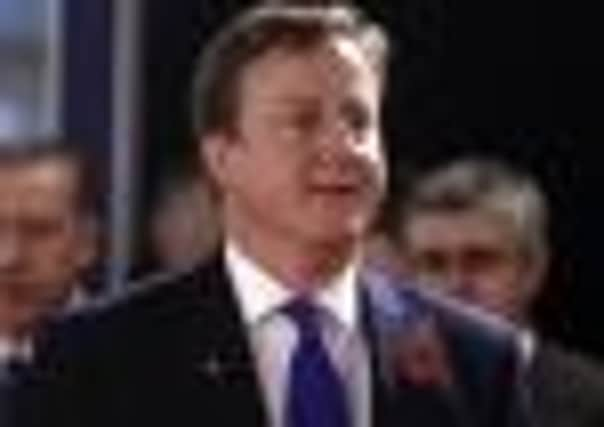Cameron risks euro backlash over cash for IMF


Mr Cameron used the G20 summit in France to press for an increase in the resources available to the International Monetary Fund (IMF) to support struggling economies.
The announcement came on a dramatic day for the eurozone which saw Greece drop its plans for a referendum on a bail-out package which will save it from financial collapse and its Prime Minister, George Papandreou, clung on to power for another day amid calls for him to resign.
Advertisement
Hide AdAdvertisement
Hide AdMr Papandreou’s U-turn, which followed crisis talks with French President Nicolas Sarkozy and German Chancellor Angela Merkel, buoyed the markets with the FTSE 100 Index up by more than one per cent. Markets in Europe and the USA also rose.
At the Cannes summit Mr Cameron and Chancellor George Osborne said Britain was prepared to consider increasing its commitment to the IMF, which currently stands at around £29bn – 4.5 per cent of the total £600bn available.
It comes just 24 hours after the Prime Minister said the UK would not contribute to any eurozone bail-out fund for Greece, nor any IMF package specifically designed to shore up the single currency.
However, the move is likely to provoke political controversy in the UK if the first states to make a claim on the money are beleaguered eurozone nations like Italy or Spain.
Advertisement
Hide AdAdvertisement
Hide AdThe eurosceptic Bruges Group reacted angrily, with its director, Robert Oulds, saying: “It seems that the British Government is planning to borrow yet more money we do not have, to bail out countries whose economies have been all but bankrupted by dint of their membership of the euro.
“Instead of wasting more of UK taxpayers’ money trying to stave off the inevitable and costly disintegration of the eurozone, David Cameron and George Osborne should be calling for a managed and orderly dismantling of the single currency, before Britain is forced to throw good money after bad.”
And Shadow Chancellor Ed Balls said any additional funding for the IMF should be held back until the details of the permanent eurozone bailout fund had been agreed.
“The IMF’s job is to support individual countries with solvency crises, not to solve a structural problem caused by eurozone countries being unable to agree the necessary steps to support and maintain their monetary union,” he said.
Advertisement
Hide AdAdvertisement
Hide AdMr Cameron said, however, the move was right thing to do, given that the world “is in crisis”.
“No government ever lost money by lending money to the IMF, which supports countries right around the world. What we wouldn’t support is the IMF investing directly in some euro bailout fund. That wouldn’t be right and we won’t back it.
“There is no risk to the British taxpayer of seeing the IMF play its proper role.”
Officials stressed that no figure had yet been proposed for an enhanced IMF fund or any potential increase in the UK contribution.
Advertisement
Hide AdAdvertisement
Hide AdThe Chancellor said there was “a general willingness around the table to contemplate and consider an increase in IMF resourcing”.
The UK has always been a supporter of the IMF and said it would be “strange” if it “walked away” at a time of global crisis, he said.
Britain’s exposure to the IMF does not increase the national debt or deficit, as the funds are treated as part of the UK’s foreign currency reserves.